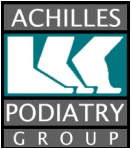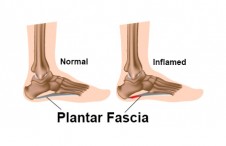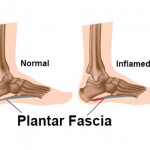Sharp pain in your heel when you step out of bed is a terrible way to start the day. If this sounds familiar to you, you’ll be glad to know that Achilles Podiatry Group can provide relief – most likely without having to resort to surgery.
In addition to striking after periods of rest, heel pain can also begin after active periods, when you finally sit down and get off your feet. Pain can radiate up your leg or into the arch of your foot, making walking uncomfortable even in your most comfortable shoes.
What causes heel pain?
Typically, the problem starts with the plantar fascia, a ligament that spans the bottom of your foot from heel to toes. This tough ligament isn’t meant to stretch much, giving your foot the support it needs for walking. When your foot flattens too much, the plantar fascia is stretched too far, and small tears may occur where the ligament attaches to the heel bone. This may cause a spur to form on the base of your heel bone. While you’d think this bone spur is what’s causing the pain, it probably isn’t. What really hurts is the tearing of your plantar fascia ligament away from the heel bone.
Flattening of the foot is related to the structure of the joint complex just below your ankle, and the problem develops from repeated straining of the ligament over time. Wearing heels frequently may also cause tightness of your calf muscles, which can contribute to flattening of your arches. Even low heels – such as those often found on cowboy boots – are enough to cause a problem.
Why is the pain worse in the morning or after periods of rest? While you’re resting, your body begins to heal the minor tears in the ligament. Once you put weight back on your foot, the ligament tears right back open, causing a sudden stab of pain that may lessen slightly as you walk.
Treating Heel Pain
While you may fear that the only thing that will relieve your pain is surgery, we have good news for you: There are many non-invasive ways to correct heel pain. Over-the-counter anti-inflammatory medications, such as ibuprofen, may help, as may arch supports and heel cushions. If heel pain persists, our doctors will conduct a thorough physical examination of your feet, and probably order digital X-rays to ensure that you’re not suffering from a stress fracture or other less-common cause of foot pain.
After we’ve pinpointed the cause of your discomfort, your Achilles Podiatry physician will develop a treatment plan to alleviate your ongoing pain. Because tightness of the calf muscles can contribute to the flattening of your feet, your plan may include a regimen of calf-muscle-stretching exercises. Other courses of treatment include night splints, orthopedic taping of the arch for added support, or cortisone injections. The Neurotherm procedure is a pain management technique using nerve ablation for management of difficult cases. For severe cases, you may be fitted with prescription foot orthotics designed to correct the cause of your foot pain. If all of these measures fail, surgery followed by the continued use of orthotics may be required as a last resort.
Don’t Wait to Seek Treatment for Heel Pain
Heel pain is likely to continue indefinitely if left untreated. Because simple treatment measures are available, there’s no reason to continue to suffer. If you’re ready to take the first steps toward eliminating your heel pain, make an appointment with Achilles Podiatry Group now.


